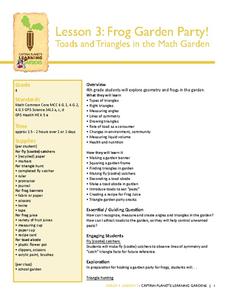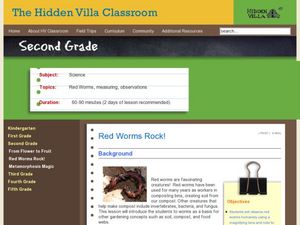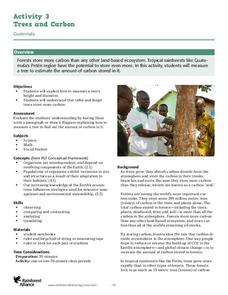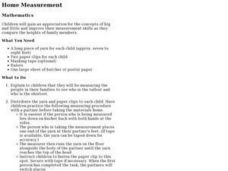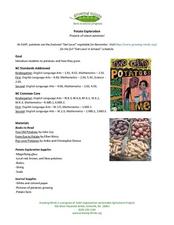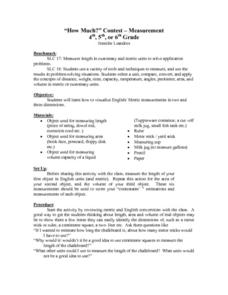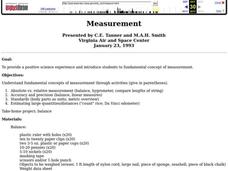Curated OER
Measures
Estimate and explore the length and weight of classroom items using standard measurement and scales. Students will work in groups to determine appropriate measuring tools, weigh or measure items, and record their results on a data chart....
Santa Monica College
Introducing Measurements in the Laboratory
We use basic units of measurement to break down things and communicate clearly. The first lesson in an 11-part series teaches the proper way to measure various items. It starts simply with measuring the dimensions and areas of geometric...
Curated OER
Making Predictions About Measurement
Upper graders experiment with measurement. They estimate the length, volume, and weight of various objects, then rotate through stations making predictions concerning measurements and then testing their predictions.
Curated OER
Fun With Rainfall Measurements
Demonstrate how rain is measured. Pupils will use a rain gauge to measure the amount of rainfall during one week. Then record the data and discuss the results.
Captain Planet Foundation
Frog Garden Party! Toads and Triangles in the Math Garden
It's frog party time! With frog banners, frog juice, and a triangle hunt, your garden party is sure to be both entertaining and educational. The lesson connects geometry, earth science, and delicious snacks to teach kids about ecosystems...
Curated OER
Milkweed and Monarch Butterfly Mania: Measuring
In this milkweed and monarch butterfly mania: measuring worksheet, students use photos of milkweed plants and caterpillars next to a ruler to estimate the measurements of 10 leaves and 15 caterpillars, calculating and recording...
California Academy of Science
How Big is Big?
In a math or life science class, "mini-me" models are created with cardstock to reflect a 1:10 scale of students' bodies. Learners measure each others' heights with meter sticks, and then reduce the size by 10. After this exercise, they...
Curated OER
When a Ruler is Too Short
Students measure distances using parallax. In this math activity, students explain how this method helped astronomers with their studies of the solar system. They determine the length of their arm using parallax and compare it with other...
Curated OER
Now That's Using Your Head!
Explore linear measurement. Scholars will measure the circumference of their head and the distance they can jump. Information is recorded, averages are calculated, and a data table is completed. They then determine possible relationships...
Curated OER
How Tall is that Tree?
Students use their feet to measure distance between themselves and a tree trunk. For this distance lesson, students use the number of steps, and string to measure distances and height of the tree. Students can get the tree...
Curated OER
Parachute Drop
Learners will have fun creating a parachute to collect data with. They will construct the parachute in small groups, measure the materials, and create an observation sheet. Then they drop the parachute and make predictions about how long...
TryEngineering
What is a Nanometer?
Exactly how small is a nanometer? Scholars investigate the scale of a nanometer by measuring classroom objects and converting these measurements to nanometers.
Curated OER
Red Worms Rock!
Second graders measure red worms. In this lesson, 2nd graders observe and collect data on red worms. Students measure the red worms and create a graph with the data they collect.
Curated OER
SDO: Measuring the Speed of an Eruptive Prominence
In this eruptive prominence instructional activity, students read about a plasma ejection from the sun measured by the Solar Dynamics Observatory. Students solve 3 problems using the given diagrams of the ejection. They determine the...
Rainforest Alliance
Trees and Carbon
You'll find everything but the kitchen sink here ... or just a carbon sink. In the activity, pairs or groups of middle school learners go outside and measure a tree's circumference and height to estimate its carbon storage potential and...
Curated OER
Home Measurement
Students explore the differences between the heights of their family members as they measure, record, and compare the data gathered. Comparisons are made to discover who was the tallest and the shortest member.
Curated OER
How Long is a Hot Dog? Weight, Weight! Don't tell me!
Primary learners participate in activities that help them explain how different things are measured. They create their own access number chart.
Growing Minds
Potato Exploration: Projects All About Potatoes!
How many potatoes tall are you? Unearth this rich resource! A reading of John Coy’s Two Old Potatoes begins a cross-curricular exploration of potatoes. Class members read, write, weigh, measure, and experiment with potatoes. Additional...
Curated OER
Designing Kites
Sixth graders sketch their own kites by creating a scale drawing of an original design. In this designing kites lesson, 6th graders draw a rough sketch, then accurately draw their design on large paper with a ruler, measuring...
Curated OER
99.86% - Measuring Our Sun's Mass
Students determine just how large the sun is. In this solar system lesson, students follow the prescribed steps to draw a box that represents the size of the sun and its mass compared to the entire solar system.
Curated OER
"How Much?" Contest - Measurement
Students work with measurements of length, area, and volume capacity of a liquid. They watch a teacher demonstration of both English and metric units before they estimate and take actual measurements of assigned items a three different...
Curated OER
Measurement
Young scholars experience a positive science experiment and study fundamental concepts of measurement.
Curated OER
Are You Full of Hot Air?
Explore the concept of measuring and recording circumference. In this physical science and measurement lesson, young learners blow up balloons, measure the circumference, and record the data on an interactive graphing website.
Curated OER
Exploring Scale And Ratio
Students measure the actual size and distance of the solar system using scale and ratio. They watch and discuss a video, create a distance-scale solar system model, and compare the scale sizes of planets to their actual sizes.




